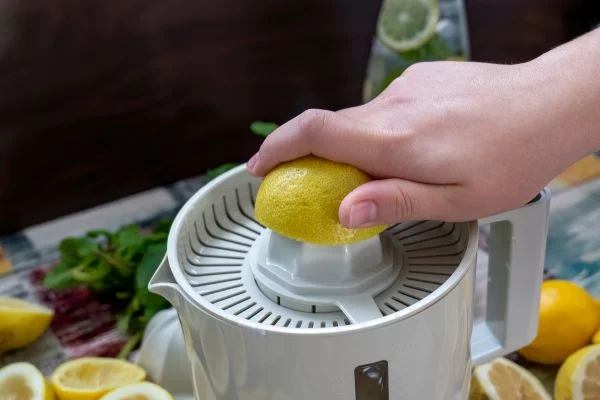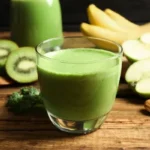Getting more vitamins and nutrients into your diet is easy with a juicer. They can help you create delicious and healthy juices from various fruits and vegetables. If you wonder Can I Use A Juicing Machine For Lemons? Let’s explore it in detail.
Can I Use A Juicing Machine For Lemons?
Lemons are a great source of vitamin C, and juicing them is a great way to get those benefits. There are several types of juicing machines, like centrifugal, masticating, and citrus juicers. Citrus juicers are the best choice for juicing lemons, specifically designed for citrus fruits.

When using a citrus juicer, it’s essential first to cut the lemon in half and remove any seeds. Place the lemon half onto the cone of the juicer and apply gentle pressure to squeeze the fruit. The juice will be collected in a cup or container placed beneath the juicer. You can also use a manual citrus juicer if you don’t have an electric juicing machine.
If you have a centrifugal or masticating juicer, you can still juice lemons, but the process is slightly different. First, remove the peel and white pith from the lemon. Then, cut the lemon into small pieces that will fit into the juicer’s feed chute. Process the lemon pieces through the juicer, and the juice will be collected in a container.
One thing to remember when juicing lemons is that the juice will be pretty tart. Add honey or agave syrup to taste if you want sweeter juice. You can add lemon juice to smoothies, salad dressings, and marinades.
Read more about Can You Put Leafy Greens In A Juicer?
What Is The Difference Between A Juicer And Citrus Juicer?
There’s no difference between a juicer and a citrus juicer, but they specialize in different types of produce and their primary function.
Juicer
Juicers extract juice from fruits and vegetables, including leafy greens and hard and soft fruits. It uses a mechanism to separate the juice from the pulp, producing a smooth and consistent juice.
Apples, carrots, kale, and celery can all be juiced with juicers since they can handle a broader range of produce.
Citrus juicer
Citrus juicers are designed to extract juice from citrus fruits like oranges, lemons, limes, and grapefruits. It is typically a simple, manual, or electric device with a reamer or cone-shaped attachment pressed against the cut side of the citrus fruit.

As the fruit is rotated, the reamer extracts the juice by crushing the pulp and separating it from the seeds and the peel. Citrus juicers are primarily used for making fresh citrus juices or extracting them for required recipes.
The main difference between a juicer and a citrus juicer is their versatility. Citrus juicers are specifically designed for citrus fruits, while juicers can handle a wide range of produce. A dedicated citrus juicer may be more suitable if you primarily plan to juice citrus fruits. However, a general-purpose juicer is better for juicing a lot of fruits and veggies.
Read more about Are Thermal Carafes Better Than Glass?
What Should You Not Put In A Juicer?
Although juicers can handle many fruits and vegetables, some shouldn’t be juiced. Here are a few examples:
- Whole pits or seeds: Hard pits or seeds from fruits like peaches, apricots, cherries, and plums should be removed before juicing. These pits are too hard and can damage the juicer’s blades or motor.
- Avocado and bananas: Both avocados and bananas have a soft and creamy texture that does not juice well. They are better suited for blending rather than juicing.
- Citrus peels: While citrus fruits are commonly juiced, removing the peel before juicing is essential. The peel contains oils that can add a bitter taste to the juice. However, you can use the zest of citrus fruits sparingly for flavoring if desired.
- Certain leafy greens: Juice some leafy greens, like spinach and kale, but not others, like rhubarb leaves and beet greens. In large amounts, these greens can be harmful because of the high levels of oxalic acid.
- Hard vegetables and roots: Tough vegetables like sweet potatoes or tough roots like ginger or turmeric may strain the motor or blades of a juicer. It’s best to grate or finely chop these items before juicing them.
Read more about Can You Cook Burgers On a Camp Stove?
Bottom Line
Now you got the answer to the question: Can I Use A Juicing Machine For Lemons? A citrus juicer is the best choice if you’re looking to juice lemons. You can still enjoy lemon juice’s health benefits with a centrifugal or masticating juicer if you don’t have one.
Remove the peel and white pith, cut the lemon into small pieces, and be prepared for a tart taste. So go ahead and add some lemon juice to your next juice creation or recipe, and enjoy the benefits of this fantastic citrus fruit!



